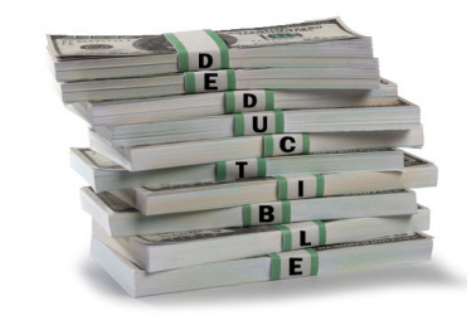
Auto insurance deductibles are among the commonly misunderstood aspect of the policy of an auto insurance. If you do not carry full coverage on the policy, but rather have only liability, you don’t have to border about deductibles. But, if you take comprehensive coverage or collision coverage, you will get a deductible for the two alternatives. The deductible you select can affect your insurance rates and affects how some types of claims will affect you financially.
How Deductibles Work
Your deductible, normally around $750 will first apply to damages. For instance, if you're in an accident in which your collision coverage applies and the vehicle you were driving suffered some damages needing $3,500 to repair, you would pay $750 from the money. The $2,750 remaining would be covered via the collision coverage by the insurer.
In some situation, where it's the fault of another driver that caused the accident, you can file a third party claim against his or her property damage coverage. In this case, your insurer might pursue a process known as subrogation to recoup the amounts he or she has already paid. Also, in the process, they may help to reclaim the amount that you paid via your deductible.
Selecting the right amount of car insurance deductible
Your first consideration when selecting your insurance deductible is the amount you can pay in case of an incident. Now, insurance companies sell coverage to you for a profit, and the more risk protection you purchase, the more they earn and the lower the deductible then, the more risk protection you're buying. Your deductible has to be set at a level in which if you pay the out of pocket expenses, now you can do so without affecting your financial situation. It is important to know that since the deductibles are usually on a per-claim basis, therefore, the frequency of the claims will be among the most vital factors. If you have a $500.00 deductible policy and you got involved in four separate claims of lower than $500, you would be responsible for the entire payments and even your insurance would give no coverage.
Now if you have little savings as well as limited wiggle room in the monthly expenses and income, selecting a policy with a lesser deductible and also higher premiums can assist you to lessen your exposure to some financial risks in case of any event. One approach to take is to look at your vehicle history. If the history shows that you may have to carry out more frequent claims, then you may want to consider choosing a policy having lower out of pocket expenses.
When you go shopping for car insurance, request for quotes with different deductible levels. This will let you see the real rate difference for different deductible amounts. In some situations, the difference won't be enough even to make it worth the risk of getting to pay more out of pocket in case of a claim. Choose a deductible which you can live with in case of damage at a rate you will live with regularly.